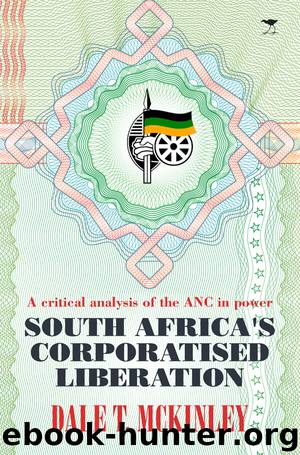SA's Corporatised Liberation by McKinley Dale T;

Author:McKinley, Dale T;
Language: eng
Format: epub
Publisher: Jacana Media
Published: 2015-12-31T16:00:00+00:00
Enclosing participation and voice
Throughout South Africa’s transition, the vast majority of the population have accepted the democratic legitimacy of the ANC state. Despite widespread and robust opposition to the neoliberal social and economic policies of that state, as well as a desire to extend the realm of democratic expression beyond the institutional boundaries of capitalist bourgeois liberalism, the struggles of that majority have not been aimed at the forcible overthrow of a (illegitimate) state. One of the key aims of those struggles, though, has been to effect a substantive change in the character and content of South Africa’s democracy and, more particularly, in the democratic place and role of the people.
The Freedom Charter and the RDP, the two documents most often referred to by workers and the poor in grounding the purpose and goals of their political and socio-economic struggles, both affirm that, ‘The People shall Govern’. Going further, the Freedom Charter posits the need for ‘democratic organs of self-government’ and the RDP speaks of the population being ‘empowered through … an institutional network fostering representative, participatory and direct democracy’. And yet, lived experience over the last twenty-odd years has affirmed something far different; namely, that the ‘State, Party and Capital shall Govern’ irrespective of what ‘the people’ need and desire; and, that the institutions for people’s participation have largely been captured by that same ‘State, Party and Capital’. The main reason why this is the case is, once again, because of the ANC’s neoliberal embrace.
One of the foundational pillars of neoliberalism is the prioritisation of the accumulative needs of corporate capital. According to the building plan, this will then generate the wealth needed that can provide the practical ways and means to address the needs of the rest of ‘the people’. This is precisely the kind of plan that the ANC has more or less followed since it came to power. Although already well in motion, former president Mbeki explicitly laid out the building plans in 2003 as captured in his ‘two-economies’ argument: ‘We must work hard to ensure that our centre, the first economy, grows and develops to generate the wealth we need to achieve the goal of a better life for all … poverty and underdevelopment act as a fetter on the further development of the first economy.’187
In other words, not only are the accumulative needs of the capitalists (who represent the ‘first economy’) to be the source of growth and prosperity ‘for all’ (who represent the ‘second economy’) but the enduring socio-economic conditions of the workers and poor who make up the majority of the ‘all’ are the main obstacle to such accumulation. Transferred onto the political terrain over the last twenty-odd years, the complementary message is principally the same, i.e., that the source of democratic legitimacy and participation is to be found in the needs of the party and state and that the dissenting voices and struggles of the majority are an attack on that legitimacy and undermining of its source. The most apt description of the kind of ‘house’ that is subsequently built is an enclosed democracy.
Download
This site does not store any files on its server. We only index and link to content provided by other sites. Please contact the content providers to delete copyright contents if any and email us, we'll remove relevant links or contents immediately.
| Africa | Americas |
| Arctic & Antarctica | Asia |
| Australia & Oceania | Europe |
| Middle East | Russia |
| United States | World |
| Ancient Civilizations | Military |
| Historical Study & Educational Resources |
Goodbye Paradise(3798)
Men at Arms by Terry Pratchett(2832)
Tobruk by Peter Fitzsimons(2507)
Borders by unknow(2301)
Arabs by Eugene Rogan(2292)
Pirate Alley by Terry McKnight(2217)
Belonging by Unknown(1854)
More Than Words (Sweet Lady Kisses) by Helen West(1853)
It's Our Turn to Eat by Michela Wrong(1724)
The Biafra Story by Frederick Forsyth(1653)
The Source by James A. Michener(1602)
Botswana--Culture Smart! by Michael Main(1597)
Coffee: From Bean to Barista by Robert W. Thurston(1539)
A Winter in Arabia by Freya Stark(1534)
Gandhi by Ramachandra Guha(1528)
The Falls by Unknown(1520)
Livingstone by Tim Jeal(1482)
The Shield and The Sword by Ernle Bradford(1402)
Africa: Altered States, Ordinary Miracles by Richard Dowden(1381)
